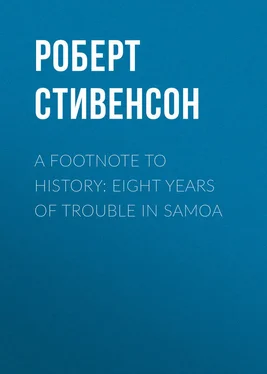It is time to follow the poor Sheet of Paper (literal meaning of Laupepa ), who was now to be blown so broadly over the face of earth. As soon as news reached him of the declaration of war, he fled from Afenga to Tanungamanono, a hamlet in the bush, about a mile and a half behind Apia, where he lurked some days. On the 24th, Selu, his secretary, despatched to the American consul an anxious appeal, his majesty’s “cry and prayer” in behalf of “this weak people.” By August 30th, the Germans had word of his lurking-place, surrounded the hamlet under cloud of night, and in the early morning burst with a force of sailors on the houses. The people fled on all sides, and were fired upon. One boy was shot in the hand, the first blood of the war. But the king was nowhere to be found; he had wandered farther, over the woody mountains, the backbone of the land, towards Siumu and Safata. Here, in a safe place, he built himself a town in the forest, where he received a continual stream of visitors and messengers. Day after day the German blue-jackets were employed in the hopeless enterprise of beating the forests for the fugitive; day after day they were suffered to pass unhurt under the guns of ambushed Samoans; day after day they returned, exhausted and disappointed, to Apia. Seumanu Tafa, high chief of Apia, was known to be in the forest with the king; his wife, Fatuila, was seized, imprisoned in the German hospital, and when it was thought her spirit was sufficiently reduced, brought up for cross-examination. The wise lady confined herself in answer to a single word. “Is your husband near Apia?” “Yes.” “Is he far from Apia?” “Yes.” “Is he with the king?” “Yes.” “Are he and the king in different places?” “Yes.” Whereupon the witness was discharged. About the 10th of September, Laupepa was secretly in Apia at the American consulate with two companions. The German pickets were close set and visited by a strong patrol; and on his return, his party was observed and hailed and fired on by a sentry. They ran away on all fours in the dark, and so doing plumped upon another sentry, whom Laupepa grappled and flung in a ditch; for the Sheet of Paper, although infirm of character, is, like most Samoans, of an able body. The second sentry (like the first) fired after his assailants at random in the dark; and the two shots awoke the curiosity of Apia. On the afternoon of the 16th, the day of the hand-shakings, Suatele, a high chief, despatched two boys across the island with a letter. They were most of the night upon the road; it was near three in the morning before the sentries in the camp of Malietoa beheld their lantern drawing near out of the wood; but the king was at once awakened. The news was decisive and the letter peremptory; if Malietoa did not give himself up before ten on the morrow, he was told that great sorrows must befall his country. I have not been able to draw Laupepa as a hero; but he is a man of certain virtues, which the Germans had now given him an occasion to display. Without hesitation he sacrificed himself, penned his touching farewell to Samoa, and making more expedition than the messengers, passed early behind Apia to the banks of the Vaisingano. As he passed, he detached a messenger to Mataafa at the Catholic mission. Mataafa followed by the same road, and the pair met at the river-side and went and sat together in a house. All present were in tears. “Do not let us weep,” said the talking man, Lauati. “We have no cause for shame. We do not yield to Tamasese, but to the invincible strangers.” The departing king bequeathed the care of his country to Mataafa; and when the latter sought to console him with the commodore’s promises, he shook his head, and declared his assurance that he was going to a life of exile, and perhaps to death. About two o’clock the meeting broke up; Mataafa returned to the Catholic mission by the back of the town; and Malietoa proceeded by the beach road to the German naval hospital, where he was received (as he owns, with perfect civility) by Brandeis. About three, Becker brought him forth again. As they went to the wharf, the people wept and clung to their departing monarch. A boat carried him on board the Bismarck
Конец ознакомительного фрагмента.
Текст предоставлен ООО «ЛитРес».
Прочитайте эту книгу целиком, купив полную легальную версию на ЛитРес.
Безопасно оплатить книгу можно банковской картой Visa, MasterCard, Maestro, со счета мобильного телефона, с платежного терминала, в салоне МТС или Связной, через PayPal, WebMoney, Яндекс.Деньги, QIWI Кошелек, бонусными картами или другим удобным Вам способом.









